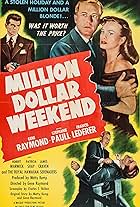When a teacher loses her job because her brother-in-law is a racketeer, she takes a position at a girls' reformatory.When a teacher loses her job because her brother-in-law is a racketeer, she takes a position at a girls' reformatory.When a teacher loses her job because her brother-in-law is a racketeer, she takes a position at a girls' reformatory.
Jack Randall
- Johnny Moon
- (as Allan Byron)
Sid Melton
- Pinkhead
- (as Sidney Melton)
Ernie Alexander
- Court Reporter
- (uncredited)
Mary Bovard
- Taffy--Convict
- (uncredited)
Beverly Boyd
- George
- (uncredited)
Gerald Brock
- Smoky
- (uncredited)
Dorothy Brown
- Elevator Operator
- (uncredited)
- Director
- Writers
- All cast & crew
- Production, box office & more at IMDbPro
Featured reviews
Arline Judge and Roger Clark head a no name cast in this Grade B flick about a woman's prison. This one ought to be seen back to back with Caged to note the difference between what an A film and a B film treatment of the same subject. I'm not sure I should dignify Girls in Chains by calling it a B film. By the way, I didn't see one chain during this entire turgid drama.
Ms. Judge is a psychologist and sister-in-law of the town's leading racketeer who gets a job despite that at a woman's prison. Roger Clark is a cop now working the juvenile beat. Together they bring down the political machine that controls the town and the women's prison which is just a patronage trough.
The film is badly edited and the story makes absolutely no sense whatsoever. Clark and Judge offered no competition to Tracy and Hepburn as a screen team. Best performance in the film is that of Emmett Lynn who played old codgers in westerns mostly. Here he does a great drunk act and actually plays the key role in bringing the villains to justice.
Probably the best known player in this is Sid Melton, later on better known as Ichabod Mudd with two 'd's, sidekick to Captain Midnight. He's the sidekick to the racketeer here. Captain Midnight was Shakespeare next to Girls in Chains.
Ms. Judge is a psychologist and sister-in-law of the town's leading racketeer who gets a job despite that at a woman's prison. Roger Clark is a cop now working the juvenile beat. Together they bring down the political machine that controls the town and the women's prison which is just a patronage trough.
The film is badly edited and the story makes absolutely no sense whatsoever. Clark and Judge offered no competition to Tracy and Hepburn as a screen team. Best performance in the film is that of Emmett Lynn who played old codgers in westerns mostly. Here he does a great drunk act and actually plays the key role in bringing the villains to justice.
Probably the best known player in this is Sid Melton, later on better known as Ichabod Mudd with two 'd's, sidekick to Captain Midnight. He's the sidekick to the racketeer here. Captain Midnight was Shakespeare next to Girls in Chains.
I'd never heard of this movie by the master of Poverty Row, Edgar G. Ulmer. The title is what drew me to it.
It's a hodgepodge of plot and subplot. It is far, far from his weird best. Music is used but not the classical music he often employed.
However, it's fun. The main character is the sister of a gangster's wife. She loses her job teaching school because of this. Not to worry, though! She has a Masters Degree in psychology.
Now, when Joyce Brothers appeared on the scene with a doctoral degree a decade later, it was a novelty. How rare this must have been in the early 1940s. (My grandmother, Smith College class of 1921, had an advanced degree and was a career gal; but she was unusual. And that was in the 1950s and sixties.)
What makes the character even more peculiar is her hairdo. Yikes! Ms. Judge sports what looks like a nest of some sort on her scalp. The women in the 1960s with bouffants had nothing on her. Furthermore, she frequently tops this with a hat. And on top of that (literally and figuratively) the hats sometimes have veils! When she gives up teaching she ends up at a women's prison. The rest is fairly routine. But it has the touch, albeit nearly imperceptible, of a master.
It's a hodgepodge of plot and subplot. It is far, far from his weird best. Music is used but not the classical music he often employed.
However, it's fun. The main character is the sister of a gangster's wife. She loses her job teaching school because of this. Not to worry, though! She has a Masters Degree in psychology.
Now, when Joyce Brothers appeared on the scene with a doctoral degree a decade later, it was a novelty. How rare this must have been in the early 1940s. (My grandmother, Smith College class of 1921, had an advanced degree and was a career gal; but she was unusual. And that was in the 1950s and sixties.)
What makes the character even more peculiar is her hairdo. Yikes! Ms. Judge sports what looks like a nest of some sort on her scalp. The women in the 1960s with bouffants had nothing on her. Furthermore, she frequently tops this with a hat. And on top of that (literally and figuratively) the hats sometimes have veils! When she gives up teaching she ends up at a women's prison. The rest is fairly routine. But it has the touch, albeit nearly imperceptible, of a master.
"Helen Martin" (Arline Judge) is an honest woman who continues to have problems keeping a steady job because her sister "Jean Moon" (Patricia Knox) is married to a well-known gangster named "Johnny Moon" (Addison Randall). That being the case she reluctantly accepts a job as a teacher at a female correctional facility which just happens to be run by a man who is almost as corrupt as her brother-in-law. Yet even though he likes things just the way they are she continues to try to improve the lives of the young women she comes into contact with. This results in a conflict which poses great risks for all involved. Now rather than reveal any more of this film and risk ruining it for those who haven't seen it I will just say that this low-budget B-movie was produced during the height of World War II and it's possible some allowances might be necessary. But even so there were some parts which were definitely in need of improvement. For example, the scenes involving the alcoholic by the name of "Lionel Cleeter" (Emmett Lynn) were especially repetitive and boring. All things considered I suppose I can give this movie 4 stars (out of 10) but even then that might be stretching it a bit.
I don't normally post for films I haven't seen, but the comment here from 1999 caught my eye. It mentions that director Edgar G. Ulmer snitched to HUAC. I had never heard this before, nor could I find any confirmation of it. I assume the poster confused Ulmer with one of his contemporaries, Edward Dmytryk, one of the Hollywood Ten who did indeed cooperate with the committee. At any rate, 8 years is long enough for that comment to go unchallenged. I'd hate to think that Ulmer's reputation could be tarnished by this apparent error, especially among viewers of these posts who may have no other knowledge of the man or his career.
Plot-- an idealistic mental health worker is conscripted into making changes in a girls reformatory run by a crooked combine. There the girls are being treated like nothing more than numbers. Trouble is the school's head is part of the criminal combine that has broad political influence. So, will the reformer be able to make the reforms needed for the girls rather than the combine.
Looks like legendary director Ulmer walked through this one. There's no evidence of his exotic stylings, e.g. Detour {1945}. Only the scenes in the reformatory carry any weight as the girls and matrons perform with some gusto. Otherwise, the leading men are blandly forgettable, even the ostensive criminal mastermind Moon (Jack Randall) fails to provide impact. On the other hand, Judge does her reformer-with-heart in persuasive fashion. But what really sinks this lightweight production is the comedy relief from a goofy Emmett Lynn. His drunken idiot is so over-the-top I wonder if Ulmer even cared. Then too, catch the clumsily mounted backdrops to outdoor action where even lake water remains motionless. Anyway, no need to go on. After all, it is a barrel bottom PRC production. I just hope the more capable actors like Judge were able to recover from this awkward effort. I know Ulmer did.
Looks like legendary director Ulmer walked through this one. There's no evidence of his exotic stylings, e.g. Detour {1945}. Only the scenes in the reformatory carry any weight as the girls and matrons perform with some gusto. Otherwise, the leading men are blandly forgettable, even the ostensive criminal mastermind Moon (Jack Randall) fails to provide impact. On the other hand, Judge does her reformer-with-heart in persuasive fashion. But what really sinks this lightweight production is the comedy relief from a goofy Emmett Lynn. His drunken idiot is so over-the-top I wonder if Ulmer even cared. Then too, catch the clumsily mounted backdrops to outdoor action where even lake water remains motionless. Anyway, no need to go on. After all, it is a barrel bottom PRC production. I just hope the more capable actors like Judge were able to recover from this awkward effort. I know Ulmer did.
Did you know
- TriviaShot in five days.
- GoofsIn the beginning of the movie all policewomen are wearing high heel shoes.
- Quotes
[first lines]
Johnny Moon: Pull over, Pinkhead.
Smoky: Now... now listen, Johnny.
Johnny Moon: Come on, Smokey.
Smoky: No no, Johnny.
Johnny Moon: Get out.
Smoky: Help! Johnny!
[gunshot]
Details
- Release date
- Country of origin
- Language
- Also known as
- Ragazze in catena
- Production company
- See more company credits at IMDbPro
- Runtime
- 1h 15m(75 min)
- Color
- Aspect ratio
- 1.37 : 1
Contribute to this page
Suggest an edit or add missing content























